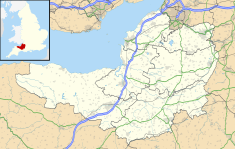
The Monmouth Rebellion, also known as the Pitchfork Rebellion, the Revolt of the West or the West Country rebellion, was an attempt to depose James II, who in February 1685 succeeded his brother Charles II as king of England, Scotland and Ireland. A group of dissident Protestants led by James Scott, 1st Duke of Monmouth, eldest illegitimate son of Charles II, opposed James largely due to his Catholicism.

The Bloody Assizes were a series of trials started at Winchester on 25 August 1685 in the aftermath of the Battle of Sedgemoor, which ended the Monmouth Rebellion in England.

Taunton is the county town of Somerset, England, with a 2011 population of 69,570. Its thousand-year history includes a 10th-century monastic foundation, Taunton Castle, which later became a priory. The Normans built a castle owned by the Bishops of Winchester. Parts of the inner ward house were turned into the Museum of Somerset and Somerset Military Museum. For the Second Cornish uprising of 1497, Perkin Warbeck brought an army of 6,000; most surrendered to Henry VII on 4 October 1497. On 20 June 1685 the Duke of Monmouth crowned himself King of England here in a rebellion defeated at the Battle of Sedgemoor. Judge Jeffreys led the Bloody Assizes in the Castle's Great Hall. The Grand Western Canal reached Taunton in 1839 and the Bristol and Exeter Railway in 1842. Today it hosts Musgrove Park Hospital, Somerset County Cricket Club, is the base of 40 Commando, Royal Marines, and is home to T he United Kingdom Hydrographic Office on Admiralty Way. The popular Taunton flower show has been held in Vivary Park since 1866, and on 13 March 2022, St Mary Magdalene parish church was elevated to the status of Taunton Minster.
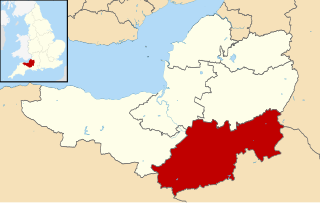
South Somerset is a local government district in Somerset, England.
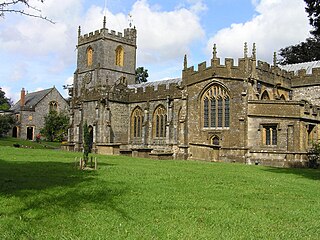
Chard is a town and a civil parish in the English county of Somerset. It lies on the A30 road near the Devon and Dorset borders, 15 miles (24 km) south west of Yeovil. The parish has a population of approximately 13,000 and, at an elevation of 121 metres (397 ft), Chard is the southernmost and one of the highest towns in Somerset. Administratively Chard forms part of the district of South Somerset.

Creech St Michael is a village and civil parish in Somerset, three miles east of Taunton in the Somerset West and Taunton district. The parish straddles the M5 motorway and includes several scattered settlements. The village of Creech St Michael and the hamlets of Charlton, Creech Heathfield, and Ham lie east of the motorway. The hamlets of Adsborough, Coombe, Langaller, and Walford lie west of the motorway. The parish has a population of 2,416.

Ashill is a small village and civil parish in Somerset, England, situated 7 miles (11.3 km) south of Taunton, and three miles north-west of Ilminster in the South Somerset district. The parish includes the hamlet of Windmill Hill and has a population of 529.

Churchstanton is a village and civil parish in Somerset, England, situated within the Blackdown Hills Area of Outstanding Natural Beauty, on the River Otter 5 miles (8.0 km) south of Taunton in the Somerset West and Taunton district.
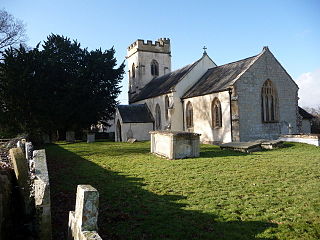
Thornfalcon is a village and civil parish in Somerset, England, situated 4 miles (6.4 km) east of Taunton in the Somerset West and Taunton district. The village has a population of 119. The parish includes the hamlet of Ash. The name comes from Thorn, and the personal name Fagun which was the Norman surname of Sir Gilbert of Thorn, whose family were lords of the manor until the 14th century.

Buckland St Mary is a village and parish in Somerset, England, situated 6 miles (9.7 km) to the west of Ilminster and 8 miles (12.9 km) south of Taunton in the South Somerset district, close to the A303. The village has a population of 521. The parish is within the Blackdown Hills Area of Outstanding Natural Beauty and includes the hamlet of Birchwood.

Winchester Castle is a medieval building in Winchester, Hampshire, England. It was founded in 1067. Only the Great Hall still stands; it houses a museum of the history of Winchester.
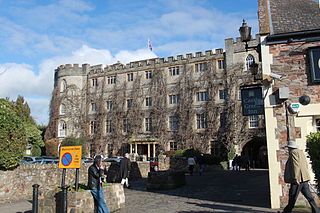
The Castle Hotel at Taunton is a hotel with two restaurants, Castle Bow Restaurant and BRAZZ, located in the centre of Taunton, Somerset, England. The business is located in a Grade II listed 18th-century reconstruction of the former 12th-century Norman fortress, Taunton Castle.

Taunton Castle is a castle built to defend the town of Taunton, Somerset, England. It has origins in the Anglo Saxon period and was later the site of a priory. The Normans then built a stone structured castle, which belonged to the Bishops of Winchester. The current heavily reconstructed buildings are the inner ward, which now houses the Museum of Somerset and the Somerset Military Museum. The building was designated a grade I listed building in 1952.
Key dates in the History of Somerset

The Shire Hall in Agincourt Square, Monmouth, Wales, is a prominent Grade I listed building in the town centre. It was built in 1724, and was formerly the centre for the Assize Courts and Quarter Sessions for Monmouthshire. In 1839–40, the court was the location of the trial of the Chartist leader John Frost and others for high treason for their part in the Newport Rising. The building was also used as a market place. The Shire Hall is owned by Monmouthshire County Council and has audiovisual guides for visitors to Courtroom 1. It is currently used as a Tourist Information Centre and as the offices for Monmouth Town Council, and is open to the public in part.

Cothelstone Manor in Cothelstone, Somerset, England was built in the mid-16th century, largely demolished by the parliamentary troops in 1646 and rebuilt by E.J. Esdaile in 1855–56.

County Hall is a municipal building in The Crescent, Taunton, Somerset, England. The structure, which is the offices and meeting place of Somerset County Council, is a Grade II Listed building.
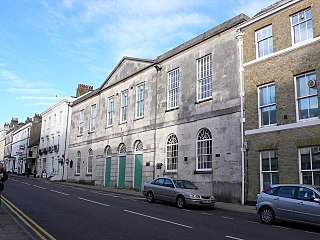
Shire Hall is an 18th-century courthouse in Dorchester, Dorset. The building was the centre of law, order and government, and served as the county hall for Dorset until 1955. It has been Grade I listed since 1950. In 2018, the hall opened as the Shire Hall Historic Courthouse Museum.
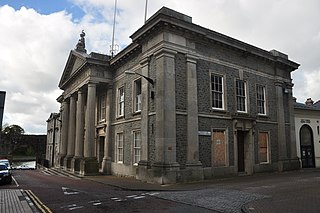
County Hall is a former municipal facility at Castle Ditch in Caernarfon, Wales. The County Hall, which was the headquarters of Caernarfonshire County Council from 1889 to 1974, is a Grade I listed building.

Wells Town Hall is a municipal building in the Market Place in Wells, Somerset, England. The building, which is the headquarters of Wells City Council, is a Grade II listed building.

